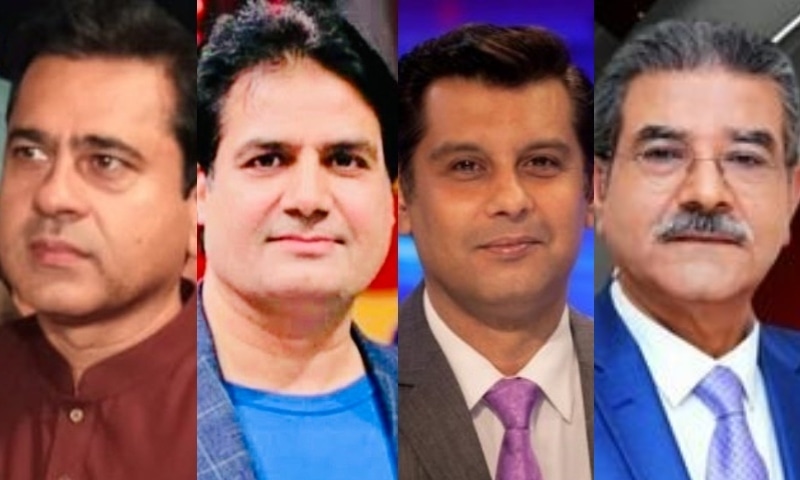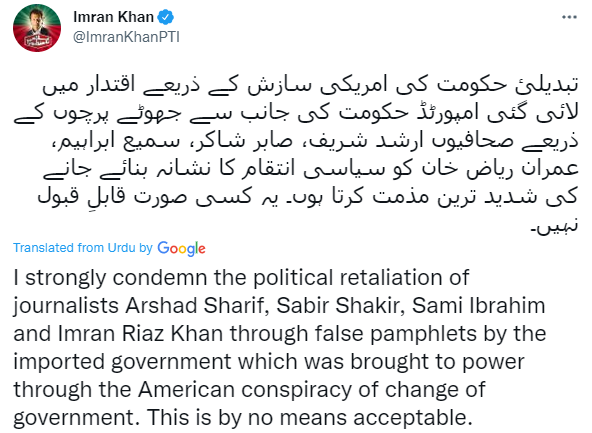PAKISTAN
Shireen Mazari’s arrest
Editorial DAWNPublished May 22, 2022 -
AS if the political climate was not toxic enough, Punjab’s anti-corruption department took former human rights minister Shireen Mazari into custody in Islamabad yesterday. The incident ignited a firestorm of denunciation across the board.
Soon after her arrest, her daughter Imaan Zainab Mazari-Hazir alleged that she had been “beaten and taken away by male police officers”. While admittedly the entire episode was not captured on camera, a video clip that emerged later showed female police officers pulling Ms Mazari by the arm out of her car after she refused to step out. That said, the timing makes it seem like a clear case of political victimisation.
The former minister has ostensibly been arrested on the basis of an FIR in which she has been accused of encroaching on a piece of land in Rajanpur district, but the timing of the arrest is suspect. Ms Mazari has of late been harshly critical of the ruling coalition as well as the senior military leadership for its declared ‘neutrality’ in the events of the last few months that led to the ouster of the PTI government.
Read: Everyone knows 'neutrals' were not actually neutral during 'regime change conspiracy': Mazari
Given that Punjab Chief Minister Hamza Shehbaz ordered her immediate release, at the time of writing it seemed highly likely she would be set free within a few hours. Nevertheless, there must be an investigation as to why Ms Mazari was taken into custody in the first place.
What happened yesterday came across as a regrettable attempt to intimidate a prominent opposition leader into silence. The PML-N-led coalition should not be using the same tactics against the PTI that the latter had employed while in government, and for which it was justifiably criticised.
And if there are other reasons behind Ms Mazari’s arrest rather than the somewhat prosaic contents of the aforementioned FIR, then she should be formally informed of what law she has violated, if any, and given full opportunity to defend herself. Abuse of power can never be condoned, regardless of who it targets or from where it emanates.
Published in Dawn, May 22nd, 2022
Editorial
DAWN
Published May 22, 2022 -
AS if the political climate was not toxic enough, Punjab’s anti-corruption department took former human rights minister Shireen Mazari into custody in Islamabad yesterday. The incident ignited a firestorm of denunciation across the board.
Soon after her arrest, her daughter Imaan Zainab Mazari-Hazir alleged that she had been “beaten and taken away by male police officers”. While admittedly the entire episode was not captured on camera, a video clip that emerged later showed female police officers pulling Ms Mazari by the arm out of her car after she refused to step out. That said, the timing makes it seem like a clear case of political victimisation.
The former minister has ostensibly been arrested on the basis of an FIR in which she has been accused of encroaching on a piece of land in Rajanpur district, but the timing of the arrest is suspect. Ms Mazari has of late been harshly critical of the ruling coalition as well as the senior military leadership for its declared ‘neutrality’ in the events of the last few months that led to the ouster of the PTI government.
Read: Everyone knows 'neutrals' were not actually neutral during 'regime change conspiracy': Mazari
Given that Punjab Chief Minister Hamza Shehbaz ordered her immediate release, at the time of writing it seemed highly likely she would be set free within a few hours. Nevertheless, there must be an investigation as to why Ms Mazari was taken into custody in the first place.
What happened yesterday came across as a regrettable attempt to intimidate a prominent opposition leader into silence. The PML-N-led coalition should not be using the same tactics against the PTI that the latter had employed while in government, and for which it was justifiably criticised.
And if there are other reasons behind Ms Mazari’s arrest rather than the somewhat prosaic contents of the aforementioned FIR, then she should be formally informed of what law she has violated, if any, and given full opportunity to defend herself. Abuse of power can never be condoned, regardless of who it targets or from where it emanates.
Published in Dawn, May 22nd, 2022
AS if the political climate was not toxic enough, Punjab’s anti-corruption department took former human rights minister Shireen Mazari into custody in Islamabad yesterday. The incident ignited a firestorm of denunciation across the board.
Soon after her arrest, her daughter Imaan Zainab Mazari-Hazir alleged that she had been “beaten and taken away by male police officers”. While admittedly the entire episode was not captured on camera, a video clip that emerged later showed female police officers pulling Ms Mazari by the arm out of her car after she refused to step out. That said, the timing makes it seem like a clear case of political victimisation.
The former minister has ostensibly been arrested on the basis of an FIR in which she has been accused of encroaching on a piece of land in Rajanpur district, but the timing of the arrest is suspect. Ms Mazari has of late been harshly critical of the ruling coalition as well as the senior military leadership for its declared ‘neutrality’ in the events of the last few months that led to the ouster of the PTI government.
Read: Everyone knows 'neutrals' were not actually neutral during 'regime change conspiracy': Mazari
Given that Punjab Chief Minister Hamza Shehbaz ordered her immediate release, at the time of writing it seemed highly likely she would be set free within a few hours. Nevertheless, there must be an investigation as to why Ms Mazari was taken into custody in the first place.
What happened yesterday came across as a regrettable attempt to intimidate a prominent opposition leader into silence. The PML-N-led coalition should not be using the same tactics against the PTI that the latter had employed while in government, and for which it was justifiably criticised.
And if there are other reasons behind Ms Mazari’s arrest rather than the somewhat prosaic contents of the aforementioned FIR, then she should be formally informed of what law she has violated, if any, and given full opportunity to defend herself. Abuse of power can never be condoned, regardless of who it targets or from where it emanates.
Published in Dawn, May 22nd, 2022
'Smacks of political victimisation': Condemnations pour in from all quarters on Shireen Mazari's arrest
-






